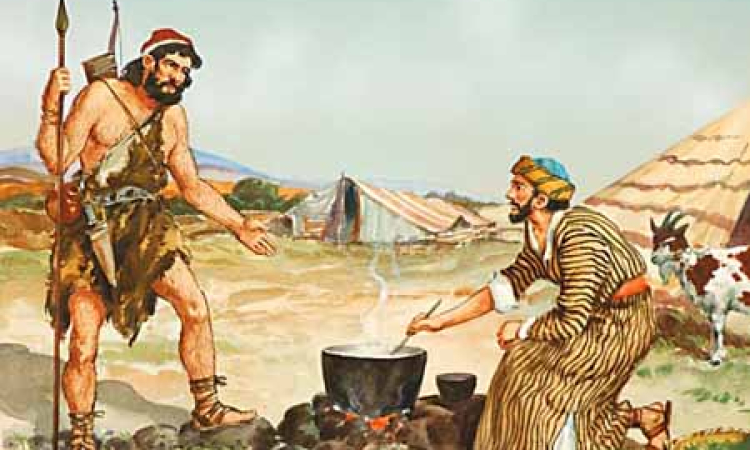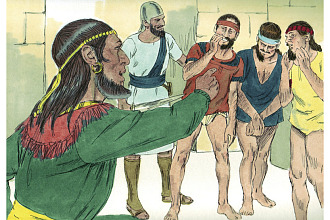“Now Jacob cooked a stew; and Esau came in from the field, and he was weary. And Esau said to Jacob, ‘Please feed me with that same red stew, for I am weary.’
Therefore his name was called Edom. But Jacob said, ‘Sell me your birthright as of this day.’ and Esau said, ‘Look, I am about to die; so what is this birthright to me?’ Then Jacob said, ‘Swear to me as of this day.’ So he swore to him, and sold his birthright to Jacob. And Jacob gave Esau bread and stew of lentils; then he ate and drank, arose, and went his way. Thus Esau despised his birthright.” Genesis 25:29-34
The birthright was a special inheritance given to the first born of the family which included not only material blessings but spiritual blessings as well. Yet, Esau was willing to trade all of this for stew. If he was really hungry he could have considered asking his mother to get him something to eat or find an alternative himself, but he was so focused on his temporal hunger he was willing to trade his future inheritance for instant gratification. And it was not a fair trade regardless of how good the stew may have tasted, as it could never compare to the eternal worth of the birthright.
As foolish as it is to trade a life of earthly riches in exchange for stew, (which you could probably buy a lot more of with the inheritance than the bit you may get to taste without it) it is much worse to give up a spiritual inheritance in exchange for temporary convenience. Yet often in our blindness we do make the same choice of putting temporal pleasures ahead of spiritual blessing to gratify the appetite with something temporal.
How many trade their future and their relationship with God-thus ruining their chance at a good life in this world and the world to come and their physical and spiritual life in the present- in exchange for alcohol, drugs, or other unhealthy indulgences? How many suffer from lifestyle related health conditions that could have been avoided? As much as believers would like to think that their lifestyle in terms of physical pleasures are unrelated to morality, it is not separate.
“Whoever keeps the law is a discerning son, but a companion of gluttons shames his father.” Proverbs 28:7 “Do not mix with winebibbers, or with gluttonous eaters of meat; for the drunkard and the glutton will come to poverty, and drowsiness will clothe a man with rags.” Proverbs 23:20-21 “When you sit down to eat with a ruler, consider carefully what is before you; and put a knife to your throat if you are a man given to appetite.” Proverbs 23:1-2
“Who has woe? Who has sorrow? Who has contentions? Who has complaints? Who has wounds without cause? Who has redness of eyes? Those who linger long at the wine, those who go in search of mixed wine. Do not look on the wine when it is red, when it sparkles in the cup, when it swirls around smoothly; at the last it bites like a serpent, and stings like a viper. Your eyes will see strange things, and your heart will utter perverse things…When shall I awake, that I may seek another drink?’” Proverbs 23:29-35
“Keep your heart with all diligence, for out of it spring the issues of life.” Proverbs 4:23 You cannot keep your heart diligently when you are controlled by appetite, even more so as the power the substance has to compromise your reasoning skills increases. It was through a simple act of eating the fruit God said not to eat that sin entered the world (Genesis 3). And those who do not control their passions in terms of what they put in their mouth are not likely to maintain self control in other areas either. This is because they have trained themselves to let their desires control them instead of controlling their desires by acting on principle rather than feeling.
As Esau acted on his feelings to gratify his physical appetite despite reason, by trading his birthright for stew, he also sought to gratify his emotional appetite for revenge by killing Jacob for taking the birthright he himself sold to him (Genesis 27:41), and gratified his sexual appetite despite reason by taking not one, but two wives, who caused his parents grief (Genesis 26:34-35). In contrast, Daniel, who was willing to risk insulting the king by refusing to eat the king’s food rather than defile himself, (Daniel 1) was also willing to die rather than defile his soul by worshiping a false god (Daniel 3). This is no mere coincidence; the character is built or weakened by how we handle the “little things” in life. Be careful that you don’t make a god out of you tummy while professing to serve God. “Oh, taste and see that the Lord is good; blessed is the man who trusts in Him!” Psalm 34:8
Picture originally found here


























